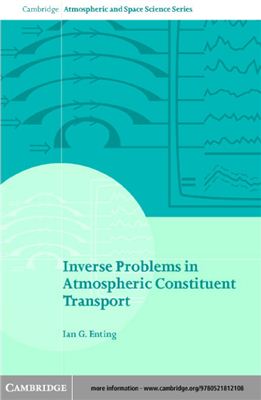Cambridge University Press, Cambridge, New York, 2002, 410 pp. -
ISBN-13 978-0-521-81210-8
The critical role of trace gases in global atmospheric change makes an improved understanding of these gases imperative. Measurements of the distributions of these gases in space and time provide important information, but the interpretation of this information often involves ill-conditioned model inversions. Various techniques have therefore been developed in order to analyse these problems. Inverse Problems in Atmospheric Constituent Transport is the first book to give comprehensive coverage of the work on this topic. The trace-gas-inversion problem is presented in general terms and the various approaches are unified by treating the inversion problem as one of statistical estimation. Later chapters demonstrate the application of these methods to studies of carbon dioxide, methane, halocarbons and other gases implicated in global climate change. Finally, the emerging field of down-scaling global inversion techniques to estimate fluxes on sub-continental scales is introduced.
This book is aimed at graduate students and researchers embarking upon studies of global atmospheric change and biogeochemical cycles in particular and, more generally, earth-systems science.
Contents
Preface
Introduction
Overview
Atmospheric transport and transport models
Estimation
Time-series estimation
Observations of atmospheric composition
The sources and sinks
Problem formulation
Ill-conditioning
Analysis of model error
Green's functions and synthesis inversion
Time-stepping inversions
Non-linear inversion techniques
Experimental design
Global carbon dioxide
Global methane
Halocarbons and other global-scale studies
Regional inversions
Constraining atmospheric transport
Conclusions
Appendices
Data-source acknowledgements
Solutions to exercises
References
Index
The critical role of trace gases in global atmospheric change makes an improved understanding of these gases imperative. Measurements of the distributions of these gases in space and time provide important information, but the interpretation of this information often involves ill-conditioned model inversions. Various techniques have therefore been developed in order to analyse these problems. Inverse Problems in Atmospheric Constituent Transport is the first book to give comprehensive coverage of the work on this topic. The trace-gas-inversion problem is presented in general terms and the various approaches are unified by treating the inversion problem as one of statistical estimation. Later chapters demonstrate the application of these methods to studies of carbon dioxide, methane, halocarbons and other gases implicated in global climate change. Finally, the emerging field of down-scaling global inversion techniques to estimate fluxes on sub-continental scales is introduced.
This book is aimed at graduate students and researchers embarking upon studies of global atmospheric change and biogeochemical cycles in particular and, more generally, earth-systems science.
Contents
Preface
Introduction
Overview
Atmospheric transport and transport models
Estimation
Time-series estimation
Observations of atmospheric composition
The sources and sinks
Problem formulation
Ill-conditioning
Analysis of model error
Green's functions and synthesis inversion
Time-stepping inversions
Non-linear inversion techniques
Experimental design
Global carbon dioxide
Global methane
Halocarbons and other global-scale studies
Regional inversions
Constraining atmospheric transport
Conclusions
Appendices
Data-source acknowledgements
Solutions to exercises
References
Index

